Transmission Replacement 3.8 L
Removal Procedure
Tools Required
J 21366 Converter Holding Strap
Perform a pressure test before removing the transmission, this will help to aid in the diagnosis.
- Disconnect the intake air temperature (IAT) sensor electrical connector.
- Remove the air intake duct.
- Remove the transmission fluid level indicator.
- Raise and suitably support the vehicle. Refer to Lifting and Jacking the Vehicle in General Information.
- Remove the 3 way catalytic converter. Refer to Catalytic Converter Replacement in Engine Exhaust.
- Unsnap the range selector lever cable from the transmission.
- Remove the propeller shaft. Refer to Two-Piece Propeller Shaft Replacement in Propeller Shaft.
- Support the rear axle with jack stands.
- Remove the rear axle torque arm. Refer to Torque Arm Replacement in Rear Suspension.
- Remove the torque converter cover. Refer to Torque Converter Cover Replacement .
- Remove the torque converter bolts.
- Remove the transmission oil cooler pipes. Refer to Oil Cooler Hose/Pipe Replacement .
- Remove the wiring harness clamp bolt (1) attaching the clamp the transmission.
- Disconnect the transmission 20-way electrical connector (2).
- Disconnect the vehicle speed sensor electrical connector (1).
- Support the transmission using a transmission jack.
- Remove the transmission mount nut.
- Remove the support bolts and the support from the rail.
- Lower the tail section of the transmission slightly.
- Remove the transmission bolts and nuts.
- Remove the transmission fluid fill tube.
- Separate the transmission from the engine.
- Attach the J 21366 to the transmission.
- Lower the transmission from the vehicle.
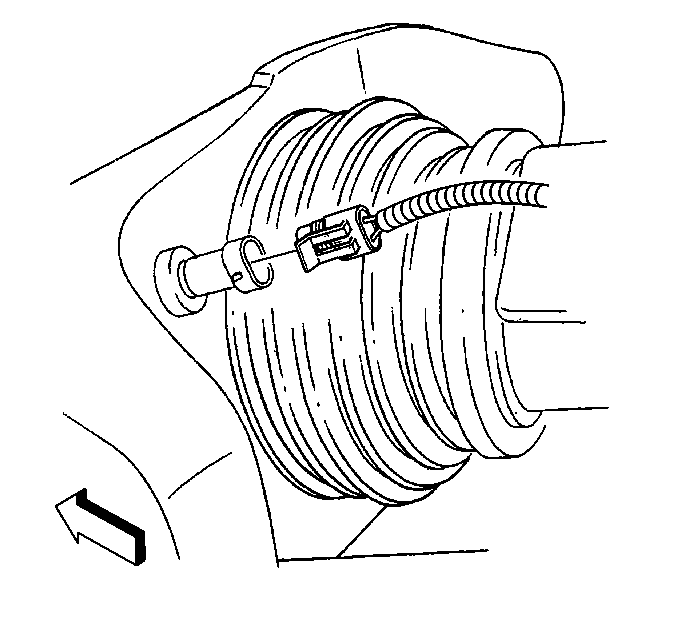
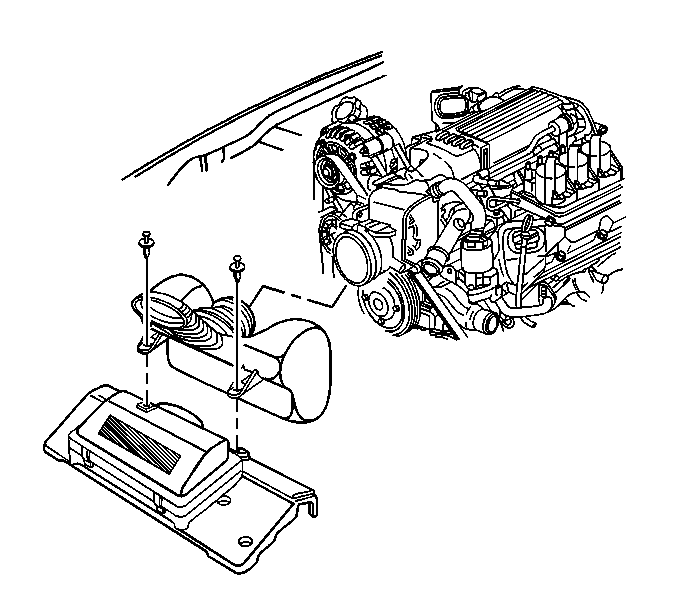
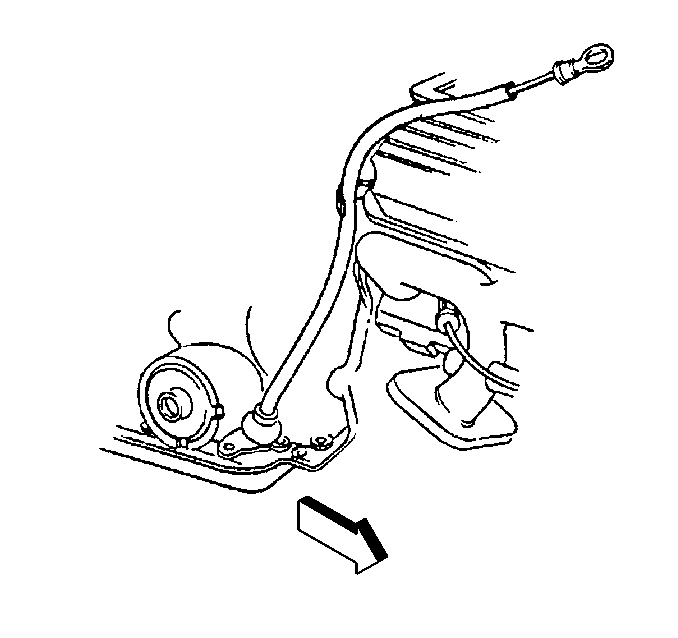
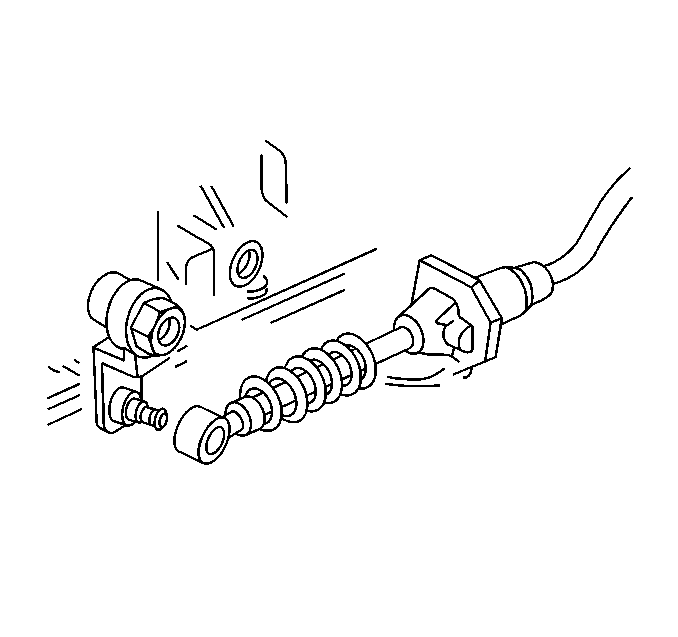

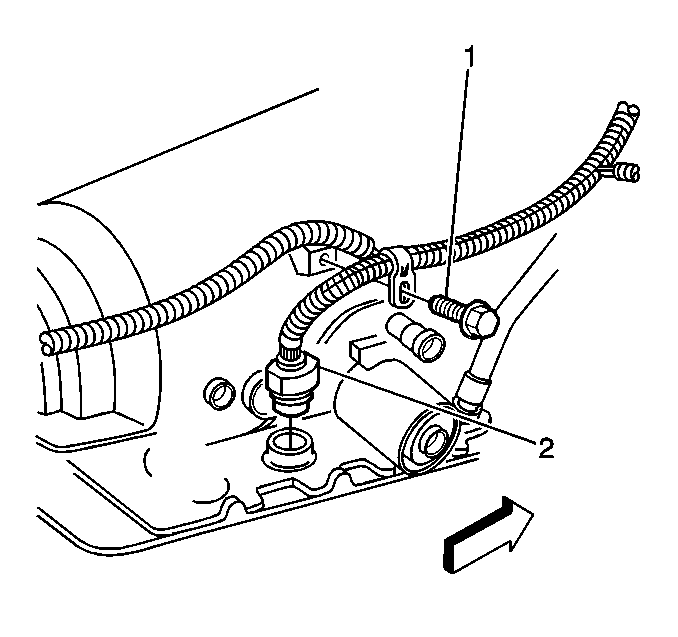
Depress both tabs on the connector and pull straight up; do not pry the connector.
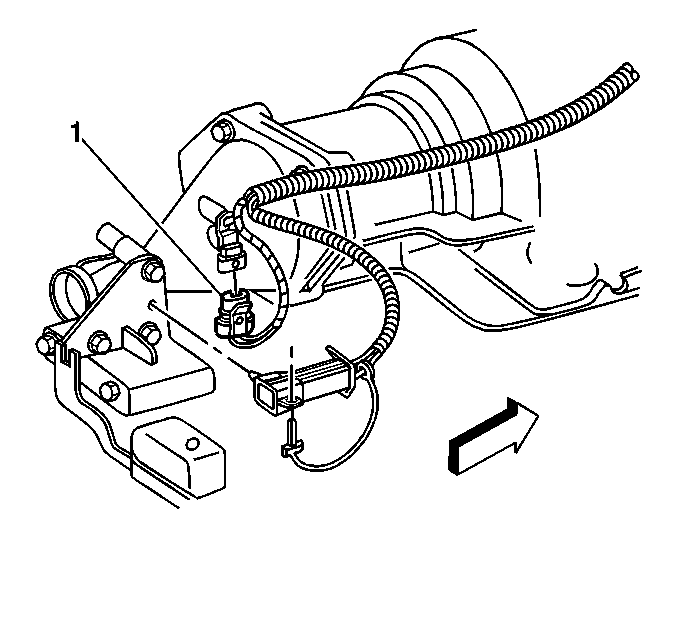
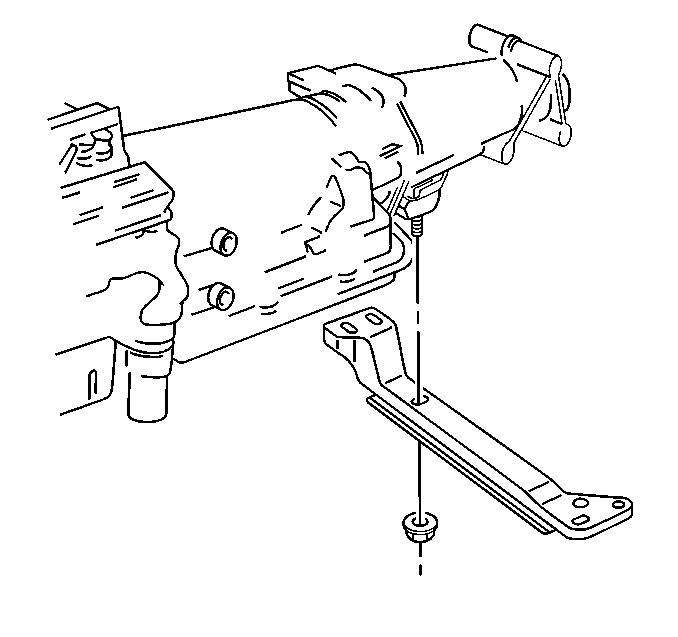

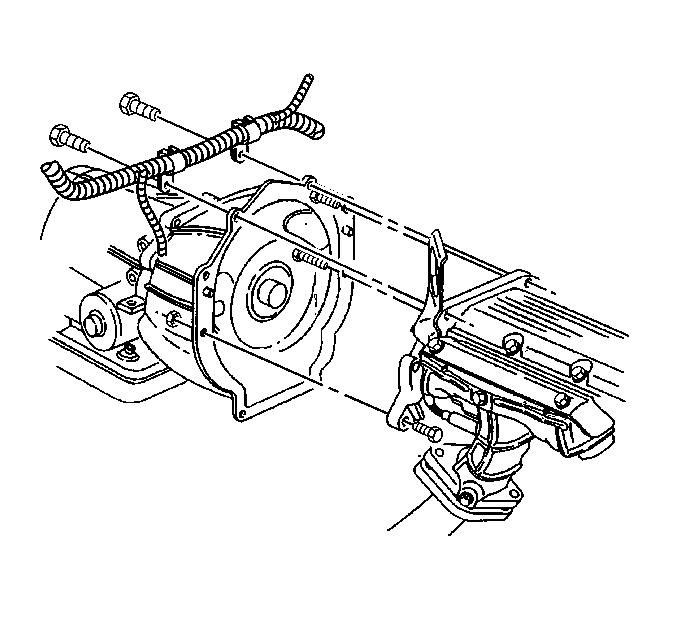
Installation Procedure
- Raise the transmission into the vehicle.
- Remove the J 21366 from the transmission.
- Align the transmission to the engine.
- Install the transmission fluid fill tube.
- Install the transmission bolts and nuts.
- Install the transmission support and support bolts to the rail.
- Install the transmission mount nut.
- Remove the transmission support.
- Connect the vehicle speed sensor electrical connector (1).
- Connect the 20-way electrical connector (2).
- Install the wiring harness clamp bolt (1) attaching the clamp to the transmission.
- Install the torque converter bolts.
- Install the torque converter cover. Refer to Torque Converter Cover Replacement .
- Install the rear axle torque arm. Refer to Torque Arm Replacement in Rear Suspension.
- Remove the rear axle jack stands.
- Install the propeller shaft. Refer to Two-Piece Propeller Shaft Replacement in Propeller Shaft.
- Connect the range selector lever cable to the transmission.
- Install the 3 way catalytic converter. Refer to Catalytic Converter Replacement in Engine Exhaust.
- Lower the vehicle.
- Install the transmission fluid level indicator.
- Connect the air intake duct.
- Connect the IAT sensor electrical connector.
- Adjust the automatic transmission shift control lever cable. Refer to Shift Cable Adjustment .
- Flush the transmission oil cooler, oil cooler pipes and the hoses. Refer to Transmission Fluid Cooler Flushing and Flow Test .
- Install the transmission oil cooler lines. Refer to Oil Cooler Hose/Pipe Replacement .
- Check the transmission fluid level.
- Reset the TAP values. Refer to Adapt Function .

Notice: Refer to Fastener Notice in the Preface section.
Tighten
Tighten the transmission bolts and nuts to 95 N·m (70 lb ft).

Tighten
Tighten the transmission support bolts to 90 N·m (66 lb ft).

Tighten
Tighten the transmission mount nut to 57 N·m (42 lb ft).


Tighten
Tighten the wiring harness clamp bolt to 2.5 N·m (22 lb in).

Tighten
Tighten the torque converter bolts to 63 N·m (47 lb ft).




Notice: Whenever you remove the transmission for service, you must perform the automatic transmission oil cooler flushing procedure in order to remove the existing fluid which may be contaminated. This will prevent contamination of the new fluid. You must perform the flushing procedure after the installation of the overhauled or replacement transmission.
Important: It is recommended that the transmission adaptive pressure (TAP) information be reset.
Resetting the TAP values using a scan tool will erase all learned values in all cells. As a result, the ECM, PCM or TCM will need to relearn the TAP values. Transmission performance may be affected as new TAP values are learned,Transmission Replacement 5.7 L
Removal Procedure
Tools Required
J 21366 Converter Holding Strap
Perform a pressure test on the transmission before servicing, this will help to aid in the diagnosis.
- Disconnect the intake air temperature (IAT) sensor electrical connector.
- Disconnect the mass air flow (MAF) sensor electrical connector.
- Remove the air intake duct.
- Remove the transmission fluid level indicator.
- Raise and suitably support the vehicle. Refer to Lifting and Jacking the Vehicle in General Information.
- Remove the oxidation catalytic converter, refer to Oxidation Catalytic Converter Replacement in Engine Exhaust.
- Unsnap the range selector lever cable from the transmission.
- Remove the propeller shaft. Refer to One-Piece Propeller Shaft Replacement in Propeller Shaft.
- Support the rear axle with a suitable jack.
- Remove the rear axle torque arm. Refer to Torque Arm Replacement in Rear Suspension.
- Remove the torque converter covers. Refer to Torque Converter Cover Replacement .
- Remove the torque converter bolts.
- Remove the transmission oil cooler pipes. Refer to Oil Cooler Hose/Pipe Replacement .
- Remove the wiring harness clamp bolt (1) attaching the clamp to the transmission.
- disconnect the transmission 20-way electrical connector (2).
- Disconnect the vehicle speed sensor electrical connector (3).
- Support the transmission using a transmission jack.
- Remove the transmission mount nut.
- Remove the support bolts and the support from the rail.
- Lower the tail section of the transmission slightly.
- Remove the transmission bolts.
- Separate the transmission from the engine.
- Attach the J 21366 to the transmission.
- Lower the transmission from the vehicle.
- Remove the transmission fluid fill tube, if necessary.
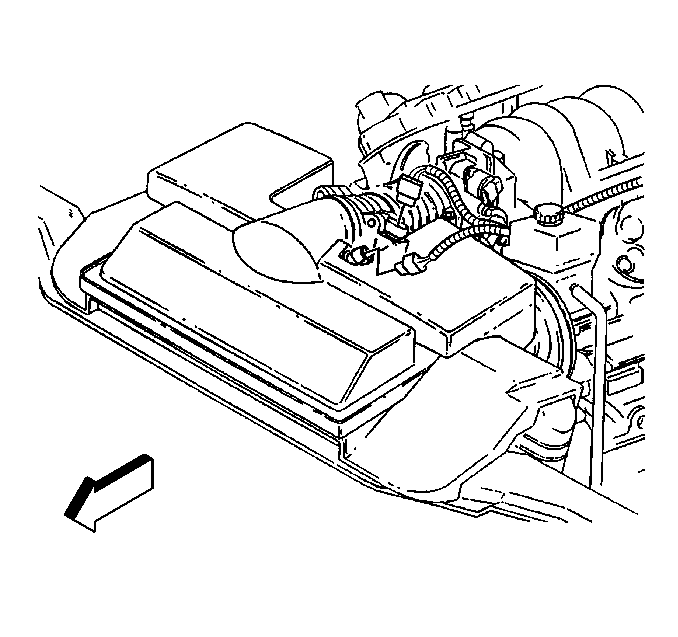
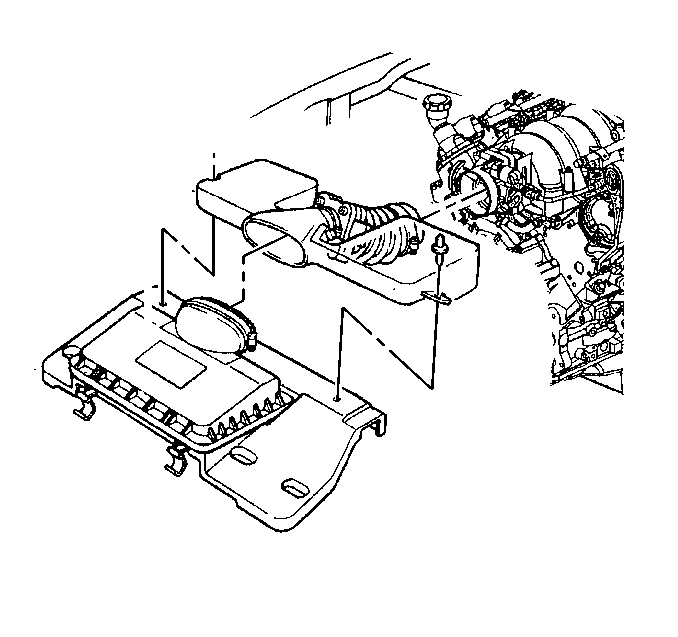




Depress both tabs on the connector and pull straight up; do not pry the connector.



Installation Procedure
- Install the transmission fluid fill tube, if necessary.
- Raise the transmission into the vehicle.
- Remove the J 21366 from the transmission.
- Align and install the transmission to the engine.
- Install the transmission bolts.
- Install the transmission support and bolts to the rail.
- Remove the transmission support.
- Connect the vehicle speed sensor electrical connector (3).
- Connect the 20-way electrical connector (2).
- Install the wiring harness clamp bolt (1) attaching the clamp to the transmission.
- Install the transmission torque converter bolts.
- Install the torque converter covers. Refer to Torque Converter Cover Replacement .
- Install the rear axle torque arm. Refer to Torque Arm Replacement in Rear Suspension.
- Remove the rear axle support.
- Install the propeller shaft. Refer to One-Piece Propeller Shaft Replacement in Propeller Shaft.
- Connect the range selector lever cable to the transmission.
- Install the oxidation catalytic converter for the left side, refer to Oxidation Catalytic Converter Replacement in Engine Exhaust.
- Lower the vehicle.
- Install the transmission fluid level indicator.
- Install the air intake duct.
- Connect the IAT sensor electrical connector.
- Connect the MAF sensor electrical connector.
- Adjust the automatic transmission shift control lever cable. Refer to Shift Cable Adjustment .
- Flush the transmission oil cooler, oil cooler pipes and the hoses. Refer to Transmission Fluid Cooler Flushing and Flow Test .
- Install the transmission oil cooler lines. Refer to Oil Cooler Hose/Pipe Replacement .
- Check the transmission fluid level.
- Reset the TAP values. Refer to Adapt Function .

Notice: Refer to Fastener Notice in the Preface section.
Tighten
Tighten the transmission bolts to 50 N·m (37 lb ft).

Tighten
Tighten the transmission mount nut to 105 N·m (77 lb ft).

Tighten
Tighten the wiring harness clamp bolt (1) to 2.5 N·m (22 lb in).

Tighten
Tighten the transmission torque converter bolts to 60 N·m (44 lb ft).




Notice: Whenever you remove the transmission for service, you must perform the automatic transmission oil cooler flushing procedure in order to remove the existing fluid which may be contaminated. This will prevent contamination of the new fluid. You must perform the flushing procedure after the installation of the overhauled or replacement transmission.
Important: It is recommended that the transmission adaptive pressure (TAP) information be reset.
Resetting the TAP values using a scan tool will erase all learned values in all cells. As a result, the ECM, PCM or TCM will need to relearn the TAP values. Transmission performance may be affected as new TAP values are learned,